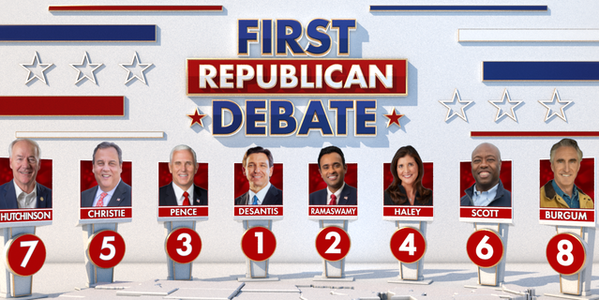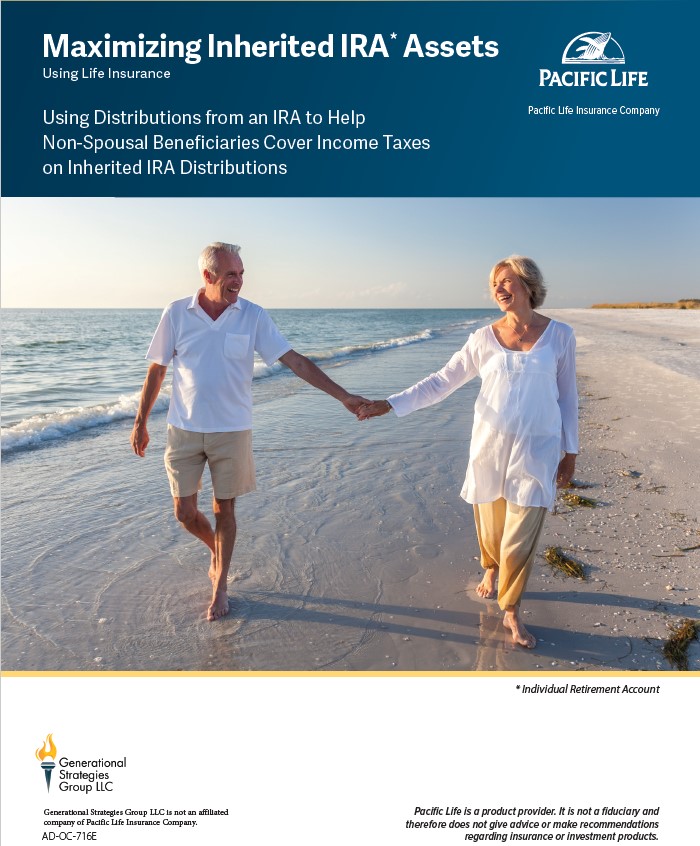| Nine candidates have qualified for the first Republican presidential primary debate, which will take place in Milwaukee, Wisconsin on Wednesday, August 23. The debate will air on Fox News beginning at 9 p.m. eastern standard time. You may have heard that one candidate, former President Donald Trump, will not be participating in the event, meaning we will only hear from eight of the qualified candidates. In 2017, President Trump signed into law the Tax Cuts and Jobs Act, which lowered both taxes for corporations and individual tax rates for most households. The Act also drastically raised the federal estate tax exemption from $5,490,000 in 2017 to $11,180,000 in 2018. This amount is also indexed for inflation, which has driven it up to $12,920,000 in 2023. This exemption is due to sunset at the end of 2025, meaning the amount will revert to the 2017 amount as adjusted for inflation. If any of the candidates we see on stage on Wednesday night go the distance and become the 47th President of the United States, they will be faced with a possible rewrite of tax law high up on their to-do list. Our firm has put together this preview of the candidates’ previous positions on issues that are key to our practice, primarily estate planning. As it is still relatively early in the election cycle, each candidate’s respective stance on these issues may not have yet been widely reported. We plan to keep this newsletter updated as the primary elections progress. Ron DeSantis When he was in congress, DeSantis co-sponsored the FairTax Act, which would impose a 23% national sales tax to replace income, corporate, and estate tax. In 2017, DeSantis voted in the US House in favor of the Trump tax cuts. So far, he has suggested he favors extending parts of the Trump tax cuts, including the lower individual tax rates and certain corporate write-offs. In May 2022, Governor DeSantis signed a trust law into effect that includes a provision that makes Spousal Lifetime Access Trusts (SLATs) even more attractive to Florida residents. While the details of this law are outside the scope of this guide, SLATs are a tool we frequently implement into our client’s estate plans. Also signed into law was a provision that extends Florida’s Rule Against Perpetuities from 360 years to 1,000 years. This means that certain Florida trusts will be able to remain in effect for an entire millennium. There is no state estate tax in Florida. Vivek Ramaswamy So far, Ramaswamy has not made public comments regarding his stance on extending the Trump tax cuts. He has stated broadly that lower taxes are necessary as part of a pro-growth policy. Mike Pence While serving as vice president, Pence stated that he would like Republicans to repeal the federal estate tax, although this did not make it into the final enacted version of the Tax Cuts and Jobs Act of 2017. He reiterated his support for the legislation during the 2020 vice presidential debate and called for extending the tax cuts during his presidential campaign kick-off speech in June of this year. As governor of Indiana in 2013, Pence cut state individual income and corporate taxes and eliminated the state inheritance (estate) tax. In 2017, when announcing the framework of what would become the Tax Cuts and Jobs Act, President Trump spoke highly of these tax cuts and cited them as an example to be followed. Tim Scott Scott voted for the 2017 Trump tax cuts, which he partially authored. His campaign website states that he favors cutting taxes and making tax cuts permanent. In March of this year, Senator Scott was one of 40 GOP senators to cosponsor the Death Tax Repeal Act, a piece of legislation with the explicit purpose of eliminating the federal estate tax. As of now, this bill has not been passed by the Senate. Nikki Haley Haley has supported the 2017 Trump tax cuts. As governor of South Carolina, she has advocated for eliminating the state corporate income tax and reducing the state individual income tax. There is no state estate tax in South Carolina. Chris Christie Christie has said that he would extend the 2017 Trump tax cuts. As governor of New Jersey, Christie eliminated the state estate tax, although there is still an inheritance tax in the state. Doug Burgum Burgum praised the 2017 Trump tax cuts when it passed. This year he signed a tax relief bill that claims to save $515 million over the next two years for North Dakota taxpayers. There is no state estate tax in North Dakota. Asa Hutchinson Hutchinson has praised the 2017 Trump tax cuts. As governor of Arkansas, he signed into law legislation that cut individual income and corporate tax rates. |
2024 Republican Primary Debate Guide


